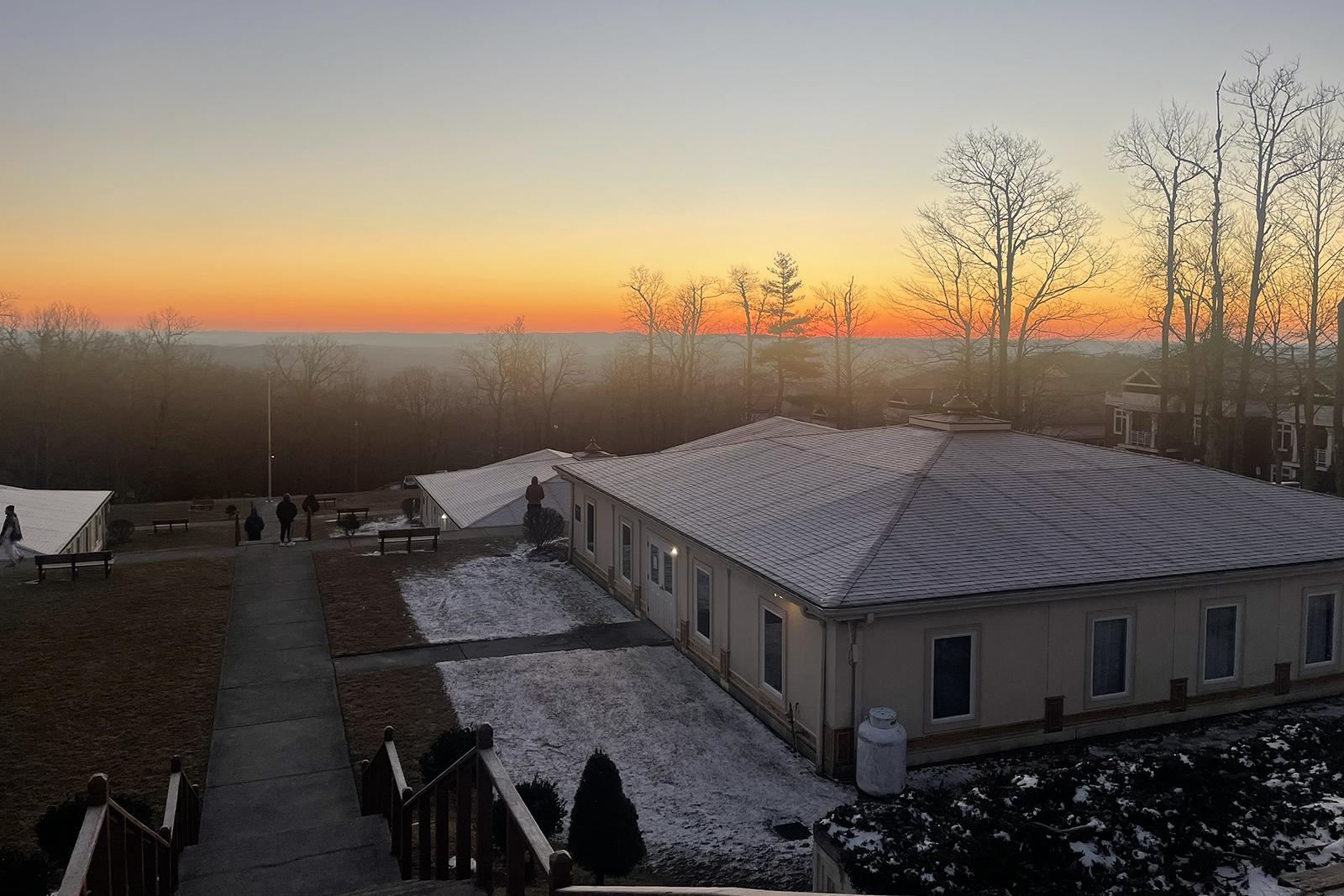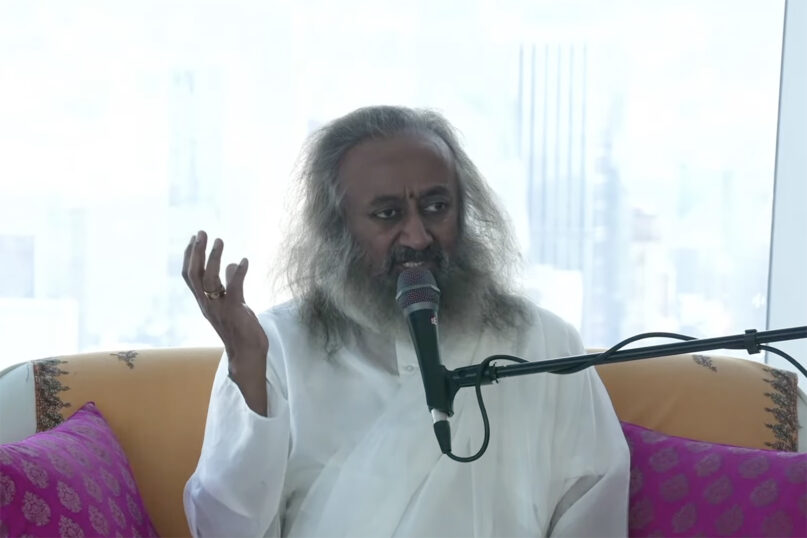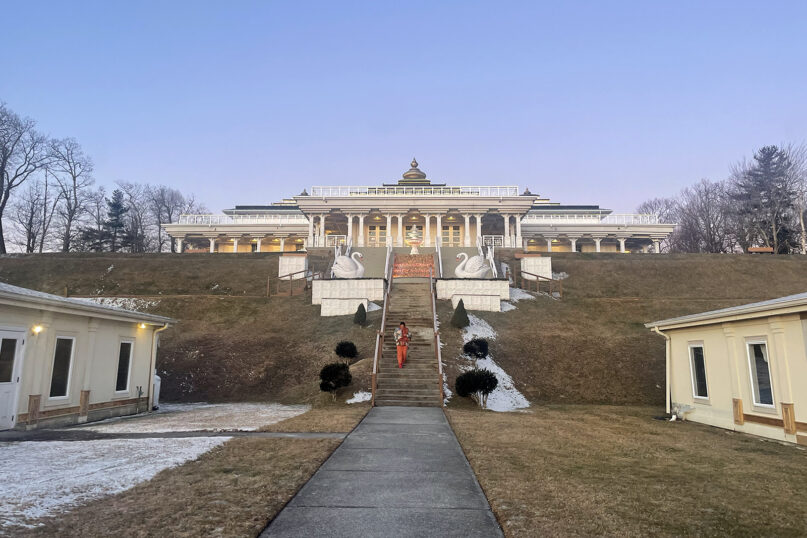
BOONE, N.C. (RNS) — On Saturday (Dec. 21), designated World Meditation Day by the United Nations, 8.5 million people participated online in a guided meditation with the renowned guru Sri Sri Ravi Shankar from the meditation room at the U.N.’s headquarters in New York.
Afterward, Shankar flew to Boone, where about 1,000 people, including me, waited in the grand meditation hall of his Art of Living Retreat Center.
Shankar, a jovial and energetic 68, who is revered as Gurudev, or “Divine Teacher,” arrived to a blanket of fresh snow, dressed in thin white robes. (“The cold is my friend,” he told someone who asked how he was able to stand the frigid air.)
As he took the stage, dozens rushed over to shower Gurudev with flowers, prayer beads and their own hands to touch his feet in reverence. Someone in the crowd shouted, “I love you Guruji!” In response, the teacher joked, “You don’t have a choice!”
In 1981, when he started the foundation, meditation was widely viewed with skepticism in the West, he said, and many had the idea that “an idle mind is the Devil’s workshop.” The U.N.’s adoption of meditation showed how prevalent the practice has become among people of all faiths and ethnicities.
Shankar said, “When we started the Art of Living Foundation, people used to ask, ‘You meditate? What?'” Now, he said, people ask, “What, you don’t meditate?”

Sri Sri Ravi Shankar livestreams a World Meditation Day event, Saturday, Dec. 21, 2024. (Video screen grab)
Shankar, called by the double honorific Sri Sri to amplify respect, studied in his native India under Maharishi Mahesh Yogi, the guru known for spreading the mantra-based Transcendental Meditation across the globe, in part thanks to its adoption by The Beatles in the 1960s. But Shankar’s development of the Sudarshan Kriya, or SKY breathing technique, laid the foundation for the Art of Living, an institution focused on “mental hygiene” for the unique stresses and pains of the modern world.
My occupation entails equal parts talking and writing, and my free time is spent reading, singing or listening to music. My mind, in sum, is a constantly chattering place. Shopping for a reprieve as well from the fast, noisy pace of my current home base of New York, I came across the Art of Living’s retreat “Stepping into Silence.”
The retreat, which forbids all my normal activities and instead requires two full days of silence, beckoned to me. The price was lofty, but I would be able to experience the privilege of no social obligations, no external stimuli or distractions and no influences other than the wisdom passed down from ancient India.
I took the plunge.
Flying to Charlotte, I caught a two-hour shuttle bus into the Blue Ridge Mountains. As the bus wound along the road leading to the retreat center, the bus driver remarked, “Y’all are heading to the middle of nowhere!” My fellow passenger responded: “That’s the intention!”
I found my room in the hotel-like lodge and dumped my cellphone in a drawer.

The Art of Living Retreat Center in Boone, N.C., early Sunday, Dec. 22, 2024. (RNS photo/Richa Karmarkar)
The campus was sprawling, a 20-minute walk uphill from south to north. Our schedule, before and during the two days of silence, included early morning yoga; fresh Ayurvedic vegetarian meals; and instruction sessions with Art of Living staff, with plenty of breaks for reflection (or a trip to the on-site Shankara Ayurveda Wellness Spa). I became friendly with a number of attendees, who had all come for different reasons.
A couple in their 60s from Austin, Texas, were making their seventh retreat together. The wife’s migraines had gone away, she said, from just one practice of SKY breathing, which kept both of them on the Art of Living path from 2009. After taking online meditation courses out of boredom during the COVID-19 pandemic, a mother, grandmother and two teenagers had come from Indiana for the in-person version. An undergraduate from Pune, India, had come just to be in Gurudev’s presence. One 23-year-old told me simply, “My mom signed me up for this without me knowing.”
I was eager to get into silence, despite cautions from a fellow New Yorker and repeat retreater who warned me that going silent was a great challenge — every little noise or noncompliance from another retreat-goer was a trigger, she said.
I faced the additional challenge of having injured my tailbone from an outing to the Bryant Park ice skating rink, making meditating or learning in a seated position on the floor particularly painful. On day two, I accidentally broke my silence with a swear word, having woken up just 10 minutes before a 7:30 a.m. yoga class.
But the most difficult part was confronting the inner workings of my mind — the past memories and future worries that were “dusted up” by the vacuum of meditation.
As my instructor Jim Larsen put it, meditation deletes the samskaras, or impressions, left behind on the brain from painful events of the past; those memories still exist but no longer provoke such strong emotions when they pass through the subconscious. Larsen, a longtime meditator who traveled around the world with Gurudev in the 1990s, said the term samskaras, funnily enough, sounds a lot like the English word scars.
The benefits of SKY meditation, according to longtime practitioners, can be far-reaching, and the practice has been shared in more than 180 countries, on 140 college campuses and even in numerous prison systems. The 40-minute sequence of controlled breath patterns, called pranayamas, led us into a deep, meditative trance-like state, where I could actually see and hear my thoughts coming in one by one and release them with ease. In the bathroom one day, I overheard a woman who had experienced her first SKY practice, “The prana (life-force energy) is flowing through me like crazy!”
The art of living, of attaining bliss, I learned, is to truly let go — of the past, of expectations for the future (an imagined reality, we were told), and of judgments about myself and others — and, overall, just to breathe.
On our last day at the center, my group was given a special treat: an intimate gathering with Gurudev — in Sanskrit, a darshan, or “seeing and being seen by a divine presence.”
At the meeting, Gurudev proclaimed himself willing to field any of our questions. A woman seated close to me asked Gurudev, “What is your relationship to Jesus Christ?” Smiling, Gurudev responded succinctly: “It is all love. We are all one.”

Sri Sri Ravi Shankar, center in white, leaves the Art of Living Retreat Center in Boone, N.C. (RNS photo/Richa Karmarkar)
Meditation and religion, Shankar said, are two separate entities, the former simply being the method to achieve harmony between the mind and the body, connected in breath. He told us that having a faith practice is great, but without the universal practice of meditation, one is chanting, praying or bowing down to the Divine without a deeper understanding of the human connection to Him, Her or It.
Out of a long silence, I raised my hand and asked a question that had been on my mind as I walked the beautiful campus. “Is it preferable for someone on the spiritual path to live in nature, rather than a crowded, busy city?”
Gurudev smiled and talked directly to me in his gentle tone: “You don’t have to pick up your entire life and move. If you have peace in your mind, you can be peaceful anywhere, even in New York or Chicago.”
I carried those words all the way to the airport back home. I smiled at every passerby, even the ones who looked at me funny. And for the first time on my own, I meditated on the plane.
